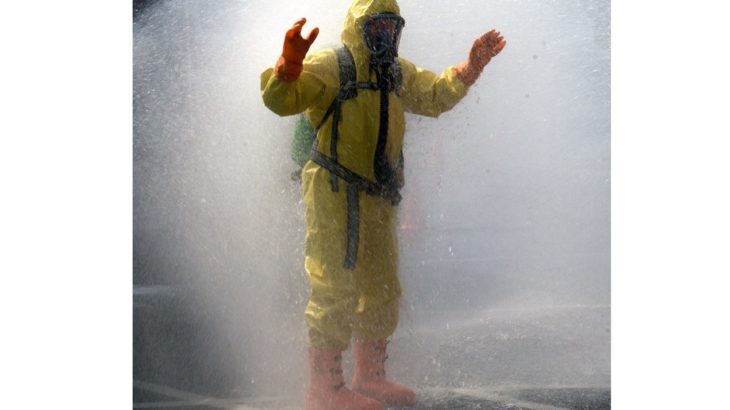As Tammy Koolbeck prepared to go on stage with the sponsor to do a curtain speech before the show, the radio erupted with the news the water fountains were exploding and water was running everywhere. Water was shooting out like a rendition of Old Faithful.
The show was ready to go on. It was Easter weekend, Good Friday, 1999, at Paramount Theatre, Cedar Rapids, Iowa. Koolbeck was GM. The event was Spirit of the Dance, opening night of a three-show run.
While her crew was trying to get water turned off, they noticed water gushing down the wall and through the rigging, so they cut the power backstage. The sound and lights went, but the house lights were still working.
They then determined water was coming from the toilets upstairs. “The toilets in the dressing rooms were also very active,” Koolbeck understated it.
Koolbeck moved the sponsor out of the way and went onstage to make a very different announcement than planned. The curtain was still down, but they were nearing showtime.
“If everybody can be patient, we had a slight mishap. There is water coming into the building and we’re trying to figure out what is going on. Please hang tight and, in a few minutes, we’ll come back out and make an announcement about the show, but as of now, the water fountains and restrooms are no longer available.”
Koolbeck was making this announcement without amplification. “Later, we invested in bullhorns,” she said. “Fortunately, I have a loud voice.”
After the initial announcement, she walked out into the house, just off stage, and one of the theater’s subscribers, who was the building manager for the building next door, came up to her.
“Hey, I’ve got my keys with me. While you’re trying to figure this out, I’ll open up my restrooms in case somebody has to go.”
So Koolbeck went back onstage and made that announcement.
She was also anticipating what might happen if the show was canceled, so her next call was to the box office.
“Get out and close up now,” she told the two-man crew. The Paramount is a 1928 theater and the box office sits like an island outside the front doors. Everyone walks past it entering and exiting. There was not enough cash in the box office to make refunds that night. She wanted it dark.
Backstage, all heck is breaking loose. Everybody is trying to figure out what is going on. “We called the city and they can’t find where the water is coming from. But they have determined that the water coming down the walls and the sound monitor is black water (contaminated water),” Koolbeck said.
“At that point we do call the show. So I have to go back out.”
“Hello again, everybody. The show is not going on tonight. The city is here trying to figure out what is going on. We have a show tomorrow. We’re rescheduling this performance for 2 p.m. on Sunday. If you can’t come Sunday, we’re here on Saturday. The box office is already closed. You can get refunds on Monday if you can’t make the show tomorrow or Sunday.”
This happened pre-internet. The only way to communicate was by phone or in-person. The theater had no way of finding ticketholders. It was a pre-data world.
Backstage, the firemen had determined that since it was black water, anyone who had contact with the water had to go the ER.
“They let us go in our own cars. Some of us were transporting the talent that had been in the dressing rooms upstairs. When we pulled up to the hospital, they were actually setting up a white tent like they were going to hose us off, like ‘Silkwood.’”
When Koolbeck got to the emergency room, she was asked:
“Are you coming from the Paramount?
“Yes.”
“We need to hold you here until we determine how we are going to process you.”
“They ended up not using the tent. They took my shoes and bagged them. I had to wash them myself.”
Everyone who could remember when they’d had their last Tetanus shot was released, booties on their feet, shoes in the bag. At least two artists had to get Tetanus shots. Anyone who didn’t remember that had stepped in the water or touched it, got a shot. No further medical care was needed.
By the time Koolbeck got back to the theater, the city had found it was a sewer line that broke outside the theater. They had already dug the hole.
“Is it going to be patched by 2 p.m. tomorrow?” she asked. “If they could tell me, we could still make the 10 p.m. news.”
They were not sure, but that’s what they would shoot for.
Her announcement to TV and media that night was that “we should be open by 2 p.m. tomorrow, but here’s the number you can call and check.”
The next day, we had an army of people manning the phones. They ended up doing the show at 3 p.m. “We couldn’t get everything back connected by 2. We switched the 7:30 show to 8. And then we had the Sunday show.”
Lessons Learned:
° If you see black water, run.
° Know who your contacts are with the city and the fire department for a hazmat incident.
° Control the crowd. As people were leaving they were seeing firemen come in.
° Think ahead, like closing the box office.
° Realize how lucky we are today to have email and social media to get the word out. On the other hand, now we can’t control the message.
° Have a loud voice, or know who does. — Based on a true story as told to Linda Deckard
